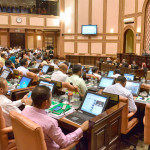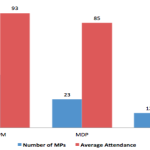In a not wholly unexpected development, President Abdulla Yameen’s ‘ruling’ coalition – led by his Progressive Party of Maldives (PPM) – has won an absolute majority in the recast 85-member People’s Majlis.
To an infant democracy that was tottering through the first five years, it should be a welcome first step, ensuring political stability for the government to address equally important and immediate issues – beginning with the nation’s tottering economy.
Between them, President Yameen and former President Mohamed ‘Anni’ Nasheed – leader of the losing Maldivian Democratic Party (MDP) – have hinted at a stable polity for the next five years. Nasheed readily conceded defeat long before the official results were known, congratulating President Yameen on the victory. Though Nasheed may not have added the names of any other leader of the ‘ruling’ Progressive Coalition, from the MDP’s side, it was saying a lot.
President Yameen had commenced the reconciliation game even before the parliamentary polls. In one of his last campaign rallies, he was quoted as saying that his government would not resort to witch-hunting or appointing commissions to probe alleged wrong-doings by previous governments. This was a reiteration of the commitment Yameen had made in public immediately after winning the hotly-contested presidential polls against Nasheed in November last.
When numbers add up
Give or take a seat or two, the provisional results – being updated sluggishly by the local media owing to a slow vote-count – showed (at the time of writing this piece) that the Progressive Coalition had won a total of 53 of the 85 seats. The opposition MDP bagged 26 seats, down by a single seat from the numbers held in the outgoing house of 77 MPs.
From among the ruling coalition members, the PPM – founded by former President Maumoon Abdul Gayoom – of which President Yameen is at present the torch-bearer, has won 33, the Jumhooree Party (JP) of former Special Majlis chairperson Gasim Ibrahim 15, and the Maldivian Development Alliance (MDA), five.
Five seats have gone to independents, with Progressive Coalition leaders claiming that they are either ‘rebels’ from constituent parties and/or would soon back the government. If true, the government would have a two-thirds majority in the new parliament.
Apart from the independents, one seat has gone to the religion-centric Adhahalath Party (AP), which had backed Yameen in the decisive second run-off round of the presidential polls last year. The party has fallen out with its ally from the first round presidential polls, the JP, over seat-sharing for parliamentary elections.
The lessons from the current series of three elections – to the presidency, the local councils, and now parliament – are clear. The Maldives will not escape the rigours and realities of coalition politics for some time to come. Coalition politics and administrations need not be bad after all, and party leaderships should accept this reality if democracy is to take deeper roots.
The absence of such realisation on the part of the MDP after Nasheed’s election as President in 2008 may have been among the major causes for the troubles that the nation and the constitutional scheme had to face in the years that followed. This meant that, unlike at present, the Nasheed government had to do without an absolute majority in parliament, which was controlled by an opposition comprising the traditional rivals in the Dhivehi Progressive Party (DRP) – then of President Gayoom – the People’s Alliance (PA) of President Yameen, and Gasim’s JP.
Nasheed attributed the poor MDP showing to the low voter turn-out, caused in turn by the Supreme Court’s alleged compromising of the independence of the Elections Commission by sacking two members a fortnight before the poll. With less than a sixth of the vote-sheets to be counted, the reported voter turn-out was 16 percent lower than the highest ever 91.41 percent in the high-voltage second-round of presidential polls on 16 November, 2013.
MDP to rebuild
While conceding the parliamentary polls, Nasheed has called upon the leaders of the MDP (which is still the single largest political party in the country in terms of registered membership) to share the blame for the electoral defeat. He has also called for laws to prevent post-poll defection by elected members, apprehensive as he may have been on that count.
While neighbouring nations like India, the world’s largest democracy, has an effective anti-defection law, the fact remains that the MDP itself mustered a parliamentary majority in the outgoing house only by encouraging defections of the kind.
Nasheed has also called upon the MDP to restructure the party organisation, and to induct younger members into positions of decision-making. As may be recalled, the MDP has been without a president and vice-president since 2012.
At 47, Nasheed may have had enough of politics and elections, and he has indicated that he is ready to pass on the baton, while continuing to remain and work in the party of which he is a co-founder as well as its most-popular face and effective advocate – both at home and abroad.
In restructuring the party, the MDP leadership would also be addressing the requirements of the future, to face the presidential and parliamentary polls five years hence. Three years from now, the MDP may have an occasion to test capacity of the restructured organisation in the local council polls. In a way, these will be a referendum of sorts on the Progressive Coalition.
Commitment to the coalition?
Even with all five independents on its side, no government is possible for the Progressive Coalition without the JP and Gasim on board. Though not immediately, but possibly after the next local council polls, the partners of the ‘ruling’ combine would be tempted to review their own positions and partnerships in the long run-up to the presidential polls, if they have not started doing already.
For now, President Yameen and JP’s Gasim – whose party has won rich dividends in the parliamentary polls owing to the continued commitment to the alliance – among others, have sworn by the Progressive Coalition.
Going by preliminary figures, the JP has now won 15 parliamentary seats against the lone seat Gasim had won for the party in 2009. Gasim has since argued that the coalition lost a few seats owing to ‘rebel candidates’ and ‘cross-voting’. Other coalition leaders have claimed that all five independents who have won this time are natural allies of the ruling combine.
An occasion would present itself immediately on testing the Coalition’s resolve to stay together when they short-list a nominee for the speaker’s post. Going by the multi-party democratic experience with and under outgoing Speaker Abdulla Shahid – who crossed over to the MDP last year – the government parties would be cautious in their choice of the next speaker.
Gasim has now thrown his hat into the ring, having previously shown his efficient floor-management as the Chair of the SpecialMajlis and effective coordination with Gayoom at a crucial stage in contemporary Maldivian history – just the qualities that are required of a parliamentary chair in the country just now. It would still be left to the twin PPM leadership of President Yameen at the administrative level and Gayoom at the political level, to take a call on this issue.
 (0)Dislikes
(0)Dislikes (0)
(0)





very good unbiased piece of writing!
We are used to the dictatorship earning over 99% in votes. This is nothing new to us.
Please note that MDA should be Maldives Development Alliance instead of Maldives Demoncratic Alliance.
Well spotted - corrected!
'Demoncratic' is the right word to describe that alliance.